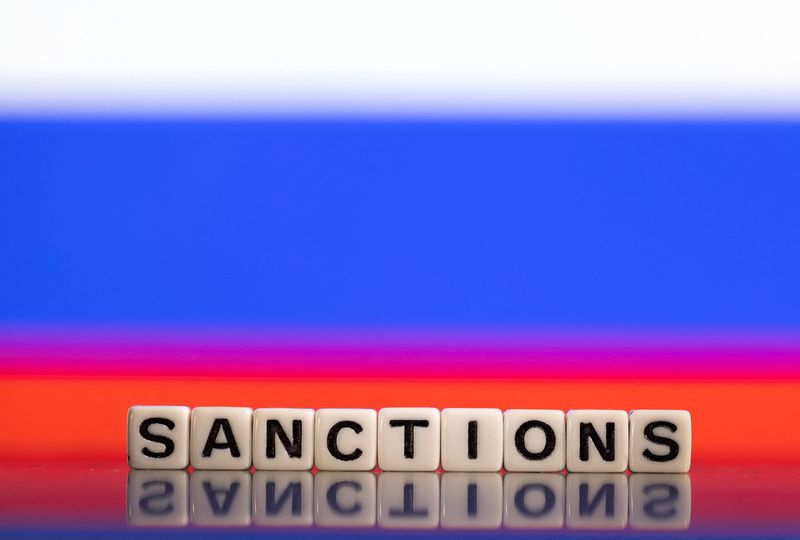LONDON (Reuters) - The European Union and Britain have unveiled their latest packages of sanctions targeting Russia, its companies and elites, as they keep pressure on Moscow with the war in Ukraine now in its third week.
Below is an outline of the latest sanctions and their implications.
WHAT'S NEW
The EU's newly approved sanctions include bans on investments in the Russian energy sector, luxury goods exports and imports of steel products from Russia.
The European Commission said in a statement that the sanctions included "a far-reaching ban on new investment across the Russian energy sector." That will hit Russia's oil majors Rosneft, Transneft and Gazprom (MCX:GAZP) Neft, but EU members will be still able to buy oil and gas from them, an EU source told Reuters.
There will also be a total ban on transactions with some Russian state-owned enterprises linked to the Kremlin's military-industrial complex.
The EU also banned S&P Global (NYSE:SPGI), Moody's and Fitch from rating Russia's sovereign debt and the country's companies.
Britain imposed sanctions on hundreds of Russian individuals and entities on Tuesday, using a new law to catch up with the EU and United States in targeting people accused of propping up Putin.
Those Britain moved against include former president Dmitry Medvedev, Defence Minister Sergei Shoigu and Russian businessmen Mikhail Fridman and Pyotr Aven.
Britain said the latest round of sanctions included elites with a net worth of 100 billion pounds ($130.63 billion).
Canada and Japan on Tuesday also announced new sanctions on Russian officials.
While the latest batch of sanctions are not targeted at Russian banks or financial systems, they will only add to the country's isolation from international markets.
Russia's second-biggest bank VTB said on Tuesday it was closing the London-based arm of its investment banking unit VTB Capital, as sanctions throttle the international operations of Russia's lenders.
Shares in Russian banks had plummeted before authorities closed the local stock exchange.
EARLIER ROUNDS
Starting in February the United States, European Union and their allies have announced round after round of sanctions, much of them targeted at the financial industry.
Among the punchiest measures was a decision to remove some Russian banks from the SWIFT global payments messaging system as well as sanctions against some of the country's biggest institutions.
EU leaders had previously agreed sanctions on Moscow that they said targeted 70% of the Russian banking market.
The U.S. Treasury Department targeted the "core infrastructure" of Russia's financial system and sanctioned Sberbank, Russia's biggest lender, and VTB.
Washington officials also wielded the government's most powerful sanctioning tool, adding VTB, Otkritie, Novikombank and Sovcombank to the Specially Designated Nationals (SDN) list. The move effectively kicked the banks out of the U.S. financial system, banned their trade with Americans and froze their U.S. assets.
The rounds of sanctions and international pressure have sparked an exodus of Western companies from Russia and the list of companies heading for the exit grows by the day. A French government spokesperson said on Tuesday it was paramount that French companies respect sanctions against Russia.
WHAT NEXT
With the war raging in Ukraine spreading to the west of the country and talks between Russia and Ukraine to try and limit the bloodshed ongoing, there has been less discussion of sanctions.
Western allies have already deployed some of their most significant measures including freezing the central bank's foreign reserves and disconnecting some Russian lenders from SWIFT.
But there are a few more levers to pull.
For the EU, the next shoe to drop would be extending its SWIFT bans to all Russian banks, including those that are heavily involved in energy-related transactions.
Sberbank and Gazprombank were not included in the SWIFT ban because they are the main channels for payments for Russian oil and gas, which EU countries are still buying.
German Finance Minister Christian Lindner said on Tuesday that no supporter of Russian President Vladimir Putin was untouchable by sanctions and his country, like its partners in Europe, was open to additional measures.
For Western banks with exposure to Russia, each round of sanctions makes it more difficult to maintain even residual links.

Banks with direct exposure have been trying to unwind their business after their shares tanked, although that is proving tough with many Russian assets frozen.
Lenders with a presence on the ground are packing up and leaving including Citigroup (NYSE:C), JPMorgan (NYSE:JPM), Goldman Sachs (NYSE:GS) and Deutsche Bank (DE:DBKGn). UniCredit (LON:0RLS) said it could decide on a costly exit from Russia too.